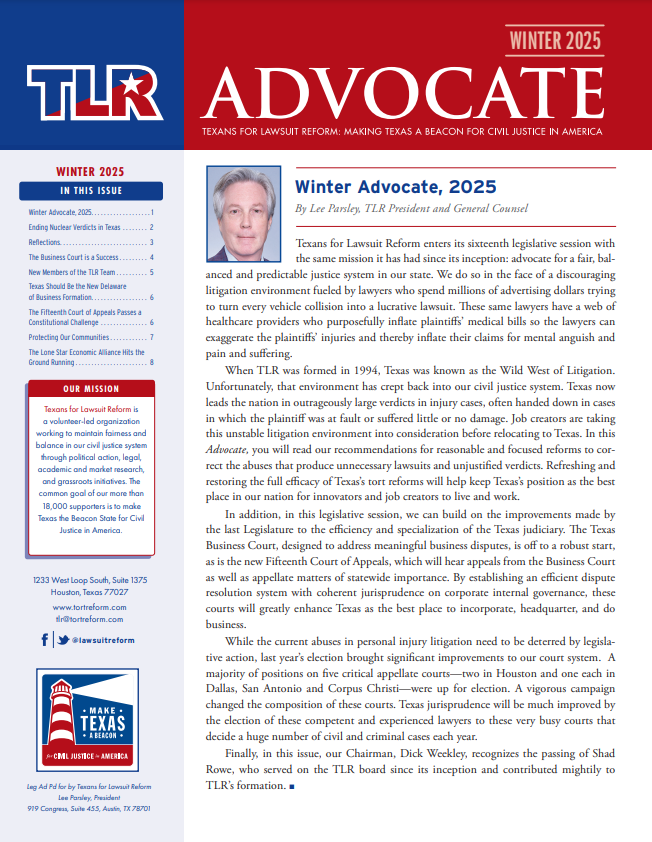Newsletters
TLR Weekly News Roundup: February 11, 2026
In less than a week, Texas voters will begin casting ballots in the Spring Primary Elections. As you prepare to cast your ballots, we are taking a look at some of the issues that are top of mind for voters.
TLR Weekly News Roundup: February 4, 2026
As affordability becomes the defining issue for voters, the role trial lawyers play in driving up insurance costs and everyday prices is becoming harder to ignore. Texans are feeling it at the kitchen table: when trial lawyers abuse the courts for profit, families and employers pay more.
TLR Weekly News Roundup: January 29, 2026
As we await the comprehensive recap for 2025, we are taking a look back at insurance fraud data from 2024 and its impact on rising costs for Texans. Kicking things off this week, though, is CEO Ryan Patrick with an interview on the Chad Hasty Show in West Texas.
TLR Weekly News Roundup: January 21, 2026
Rising insurance premiums and higher costs aren’t happening by accident. This week’s newsletter breaks down what’s driving those increases, why Texas is falling behind states that acted on reform, and how unchecked litigation is quietly draining household budgets.
TLR Weekly News Roundup: January 15, 2026
Texas did not become an economic leader by accident. Our growth was built on disciplined legal reforms that rewarded responsibility, discouraged abuse, and gave businesses and families confidence in the system.
TLR Weekly News Roundup: January 07, 2026
TLR has a 30-year track record of delivering conservative legal reforms that were the foundation of the Texas Economic Miracle. We make sure the Texas legal system works so our families and employers can succeed.
TLR Weekly News Roundup: December 23, 2025
As Texas families get ready for Christmas, the focus naturally turns to time together, traditions, and the gifts we give one another. For all of us at TLR, it is also a moment to reflect on a simple hope for the year ahead: a more affordable future for Texas families.
TLR Weekly News Roundup: December 17, 2025
This week’s news underscores the real cost of lawsuit abuse and why reform still matters for affordability. When lawsuit abuse is left unchecked, families pay more, businesses lose certainty and communities lose opportunity. That is why keeping our courts fair and predictable matters for every Texan, whether they ever step in a courtroom or not.
TLR Weekly News Roundup: December 10, 2025
This week brought new evidence of how lawsuit abuse drives up costs for families and businesses. Excessive verdicts (sometimes called nuclear verdicts) continue to inflate prices across the supply chain, with litigation projected to drive a significant share of future food-price inflation.
TLR Weekly News Roundup: December 03, 2025
This week’s news underscores why lawsuit reform matters for every Texas family. A new analysis shows Texans now pay an average of $8,653 a year for home and auto insurance, one of the highest totals in America, with rising tort costs and nuclear verdicts driving premiums higher.
TLR Weekly News Roundup: November 26, 2025
At TLR, we are grateful for the opportunity to continue this mission, protecting fairness, defending consumers, and keeping Texas on a path that allows families to thrive.
TLR Weekly News Roundup: November 19, 2025
This week brought more proof that strong civil justice systems shape strong economies. As always, TLR is focused on protecting fairness, lowering costs for families, and keeping Texas the best place to grow a business.
TLR Weekly News Roundup: November 12, 2025
Across the country, real results are proving that lawsuit reform works. Florida’s insurance market is stabilizing as litigation costs fall, Texas has once again been named the best business climate in America, and our own Texas Business Court continues to exceed expectations.
TLR Weekly News Roundup: November 05, 2025
Across the country, momentum for reform is growing as lawmakers and regulators confront the cost of lawsuit abuse and the rise of third-party litigation funding.
TLR Weekly News Roundup: October 29, 2025
This week, we’re looking at two stories that capture both the progress Texas has made and the dedication it will take to protect it, from the early success of the Texas Business Court to the growing threat of foreign influence in U.S. litigation.
TLR Weekly News Roundup: October 22, 2025
This week, we’re watching two national developments that show how lawsuit abuse is changing the risk landscape—and why Texas must continue leading the way.
TLR Weekly News Roundup: October 15, 2025
As other states face growing economic pressures from unchecked litigation, Texas is working hard to maintain a fair and balanced civil justice system.
TLR Weekly News Roundup: October 8, 2025
This week marks Lawsuit Abuse Awareness Week in Texas, and Texans for Lawsuit Reform joins Governor Greg Abbott in spotlighting the real costs of lawsuit abuse and its impact on consumers, small businesses and the state’s civil justice system. Texans pay an average of $1,725 more each year for goods and services due to excessive litigation, part of what experts call the “lawsuit tax.”
TLR Weekly News Roundup: October 1, 2025
Across the country, new developments continue to show how lawsuit abuse drives up costs and undermines growth. From California’s “hidden tax” on families to Illinois’ expansion of toxic tort litigation, states that empower trial lawyers put jobs and consumers at risk.
TLR Weekly News Roundup: September 24, 2025
President Donald Trump’s second-term agenda is facing an aggressive campaign of “lawfare” from Democrat-aligned, activist attorneys who are working to block key reforms in the courts—all while collecting oversized legal fees.
Sign Up for the TLR Weekly News Roundup
Please use the form below to receive a digest of TLR Clips – headlines and news stories about lawsuit reform from Texas and around the country. The TLR Weekly News Roundup is delivered every Wednesday.

